29 Sep2020
By Ji Soo Song
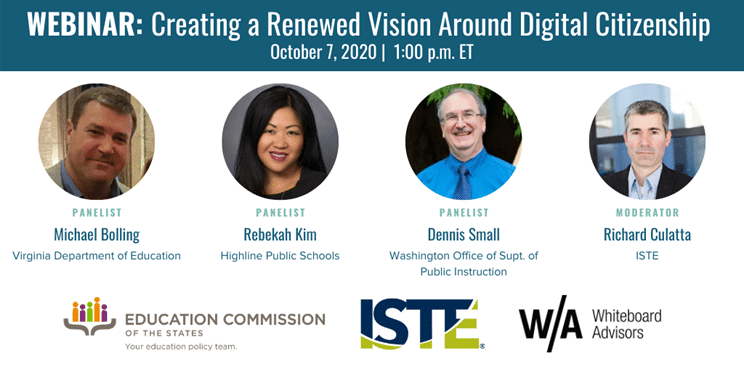
The International Society for Technology in Education (ISTE), the Education Commission of the States, and Whiteboard Advisors will host a webinar on October 7 at 1:00 p.m. ET to discuss how states and districts are continuing to embed digital citizenship and media literacy into instruction during COVID-19 and remote learning.
Creating a Renewed Vision Around Digital Citizenship
Wednesday, October 7, 1:00 p.m. ET
08 Sep2020
By Katrina Norfleet
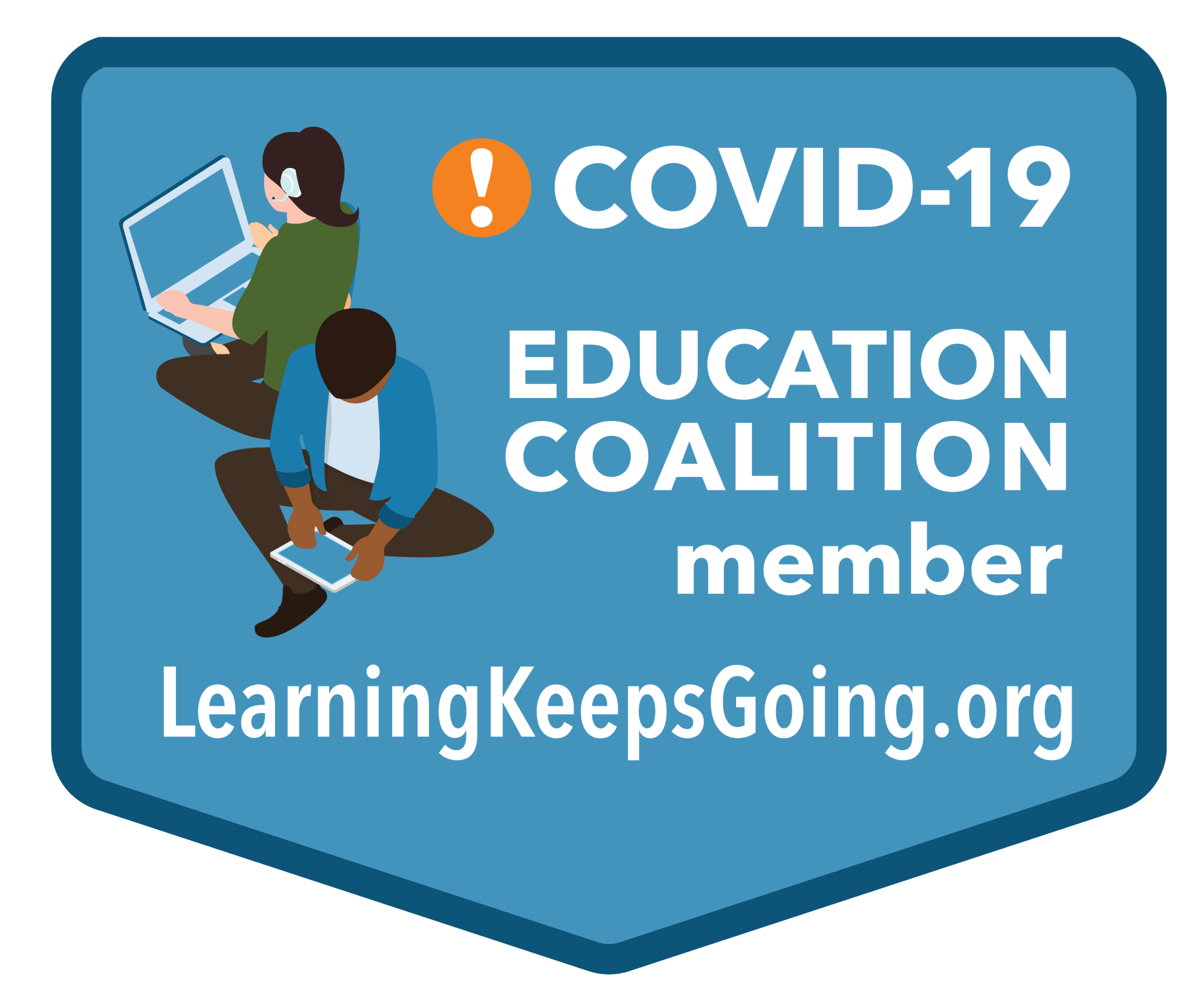 Now that technology is playing a larger role than ever before in teaching and learning, the COVID-19 Education Coalition has curated a list of resources on keeping technology systems safe, protecting student data, and promoting healthy digital decision-making in the newly released A Learning System for Privacy, Security and Digital Citizenship Infrastructure.
Now that technology is playing a larger role than ever before in teaching and learning, the COVID-19 Education Coalition has curated a list of resources on keeping technology systems safe, protecting student data, and promoting healthy digital decision-making in the newly released A Learning System for Privacy, Security and Digital Citizenship Infrastructure.
As a member of the COVID-19 Education Coalition, AACTE invites members to access this informational resource. It was created to do the following: understand the relationship between privacy and security as well as have models of effective practices in safeguarding student data; understand the roles, responsibilities, and rights of students in virtual learning environments; and understand the numerous stakeholders playing a role in student “data stewardship” and “digital citizenship” (i.e., teachers, administrators, parents, vendors, and the students themselves) and how their role is critical for both short- and long-term success.
08 Sep2020
By Jacqueline Rodriguez
AACTE has partnered with CoSN (The Consortium for School Networking) to provide school leaders with high-quality information on emerging issues and technology trends for K-12 innovation. Recently, the international advisory board of about 100 education leaders identified 15 key hurdles, accelerators, and tech enablers for schools to leverage in 2020 in order to drive innovation in K-12 education.
AACTE is proud to be a member of the advisory board for CoSN’s Driving K12 Innovation Project. The next generation of teachers and leaders are being prepared at our member institutions. In collaboration with our K-12 school district colleagues, educator preparation programs can leverage technology that supports the learning and social emotional growth of all our students.
CoSN and AACTE are committed to advancing progressive practices in the field and addressing challenges and opportunities such as data privacy and ownership, social emotional learning, and tools for privacy and safety online.
CoSN’s Driving K-12 Innovation
CoSN will issue its insights and findings from the advisory board in two individual free briefs. These publications, along with an implementation toolkit, are being released throughout 2020 to spur ongoing discussions and visibility that analyze the top hurdles, accelerators and technology enablers in K-12 education. This project is part of CoSN’s EdTechNext initiative, extending their long-standing work surrounding emerging technologies. The Driving K-12 Innovation initiative is supported by AACTE.
04 Sep2020
By Maria Hyler

This article originally appeared on the EdPepLab blog and is reprinted with permission.
As U.S. schools closed their doors this past spring in response to the COVID-19 pandemic, a little-considered effect was the impact of school closures on the preparation of the next generation of educators. Teacher and leader candidates all over the country had their field experiences abruptly cut short, and educator preparation programs (EPPs)—in partnership with school districts and state education agencies—had to adapt quickly to ensure candidates continued to receive high-quality preparation and were able to complete their licensure requirements.
As districts begin to enact school opening plans, EPPs are building off of lessons learned from the spring as they engage candidates in equity-centered, deeper learning preparation. LPI has been in discussion with members of EdPrepLab—a network of programs working to continuously improve and share their practices—to better understand how they’re responding to this unusual time. Three themes have emerged as guiding their strategy and practices moving forward:
- Focusing on core program strengths
- Shifting from crisis mode toward innovation
- Capitalizing on innovations to strengthen educator preparation after COVID-19
30 Aug2020
By Hillary Gamblin
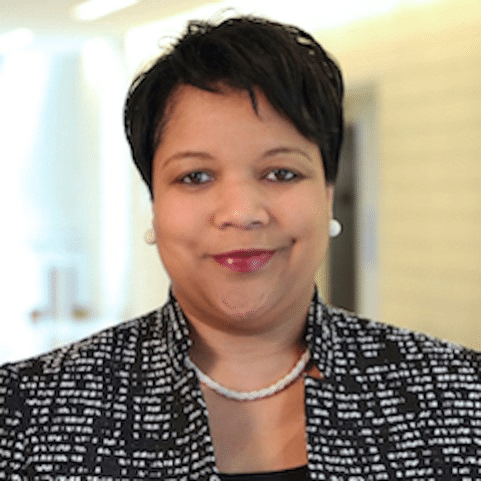 If you could build a teacher prep program from scratch, what would it look like?
If you could build a teacher prep program from scratch, what would it look like?
This wasn’t a theoretical question for Loleta Sartin. In 2005, Sartin helped develop—from the ground up—a progressive teacher education program at Middle Georgia State University, formerly known as Macon State College.
So what did she focus on? Giving candidates as many classroom experiences as possible. The program “ensured our teacher candidates were not just staying in the ivory tower,” explained Sartin. On day one, the faculty taught their courses on-site at local schools.
A decade later, Middle Georgia State found a way to provide its teacher candidates with even more diverse classroom experiences by adopting a video-based assessment tool called GoReact.
Soon, GoReact became an indispensable tool for Sartin and her colleagues to better prepare their candidates while saving their program time and money.
27 Aug2020
By Arlene Borthwick, Teresa Foulger and Kevin Graziano
Considering the ramped-up emphasis on online and remote learning, deans, department chairs, and their faculty are taking a new look at learning goals and related curricula in preparation programs to assure teacher candidates are prepared to effectively use technology for teaching and learning. Programs can no longer claim that a single “techie” faculty member or a stand-alone course on “ed tech” will provide teacher candidates with the knowledge and skills they need to be proficient with integrating technology into the learning experiences they plan.
The COVID-19 pandemic we have all experienced has clearly illustrated the need to address technology integration in more depth than siloed approaches could ever provide. An infusion approach, where technology is addressed throughout an entire teacher preparation program—from beginning to end—brings methods courses, practica, student teaching, and even liberal arts and sciences content faculty and PK-12 mentors into this framework for scaffolding candidate development.
But, wait. Just to be clear—What is the difference between integrating technology and infusing technology?
Teresa Foulger, associate professor of educational technology from Arizona State University, explains the difference in a new book, Championing Technology Infusion in Teacher Preparation: A Framework for Supporting Future Educators (Borthwick, Foulger, & Graziano, 2020):
14 Aug2020
By Nicole Dunn

Register today for the final two webinars in AACTE’s Back to School Webinars Series this month. On August 18, join AACTE and the International Society for Technology in Education (ISTE) to review and discuss survey data and case studies that cover higher education’s ability to help PK-12 schools integrate technology. Then, on August 26, rejoin EdPrepLab to learn how educator preparation has been shaped by the experiences of the spring and the demands of the new school year. Read on for more webinar details.
ISTE: Integrating Digital Technologies in Remote K-12 Learning: Lessons for Higher Education Preparation Programs
August 18, 2020 12:30 – 2:00 p.m. ET
As a result of the global health pandemic, teacher preparedness to integrate digital technology into their teaching has become a leading topic of conversation in both the PK-12 and higher education communities. How well are PK-12 teachers being prepared to integrate digital technologies and the ISTE Standards into their PK-12 teaching? What is higher education doing well? Where are the gaps?
In this webinar, you will hear from AACTE Innovation and Technology Committee co-chair Liz Kolb and Victoria Carter from the University of Michigan about two survey results pre and post COVID-19. The first survey, pre COVID-19, investigates PK-12 teachers’ and administrators’ perceptions of how well new teachers are prepared to integrate technology tools and the ISTE Standards for Students. The second survey focuses on how teachers experience remote teaching and learning during the pandemic. While both are national surveys, we will focus on the state of Michigan as a case study. The presentation will include suggestions and implications for teacher preparation in higher education as well as PK-12 district professional development for moving toward high-quality preparation of teacher candidates for face to face, remote, and blended learning environments with technology tools.
Register now
14 Aug2020
By Monika Jo

As K-12 student populations continue to diversify, it is essential for educator preparation programs to ensure teacher candidates possess the knowledge, skills, and dispositions to meet the needs of all learners. Mixed reality simulation is an effective tool to facilitate the development of culturally responsive and sustaining educators and to foster self-reflection. Through virtual simulations, instructor and peers provide critical feedback and observation of candidates’ performance via video.
Join AACTE and Mursion for the webinar, “Fostering Critical Self-Reflection: Meeting the Needs of English Language Learners through Mixed Reality Simulation,” at 1:00 p.m. ET, Tuesday, August 18. This session will detail the process used in a STEM methods course to engage candidates in addressing the needs of English language learners and provide examples of how candidate thinking and planning changed as a result. The presenters include:
07 Aug2020
By Nicole Dunn

Join AACTE on August 12 and 13 from 3:00 – 4:00 p.m. for its first back to school webinar series. Over the course of these two sessions, panelists with experience in using the Accomplished Teaching, Learning and Schools (ATLAS) library with the FAVSTE framework will introduce participants to these tools and how to use these tools to effectively utilize video tasks in teacher preparation. These ideas are applicable across different levels of certification (elementary, middle, and secondary) and school contexts.
Panelists will include the following:
- Brett Criswell – West Chester University
- Heather Jo Johnson – Vanderbilt
- Jessica Anna Arias – Kennesaw State University
- Lawrence T Escalada – University of Northern Iowa
- Shelly Forsythe – Texas State University
Register today to attend the two-part webinar: ATLAS and FAVSTE: A Tool and a Framework for Using Video in Teacher Preparation.
04 Aug2020
By Nicole Dunn
 Higher education and PK-12 school systems around the country continue to persevere through the pandemic while the policies that structure the new school year continue to change day-to-day. Since the onset of COVID-19, our partners have observed how the pandemic has affected teacher and leadership preparation programs and are excited to share lessons learned. This August, join us for a “Back to School” webinar series with three of our strategic partners: EdPrepLab an initiative of the Learning Policy Institute (LPI) and Bank Street Graduate School of Education, International Society for Technology in Education (ISTE), and the National Board for Professional Teaching Standards, Accomplished Teaching, Learning and Schools (ATLAS) group. In each, we will discuss how to apply what was learned this past spring to the upcoming academic year within higher educator preparation programs.
Higher education and PK-12 school systems around the country continue to persevere through the pandemic while the policies that structure the new school year continue to change day-to-day. Since the onset of COVID-19, our partners have observed how the pandemic has affected teacher and leadership preparation programs and are excited to share lessons learned. This August, join us for a “Back to School” webinar series with three of our strategic partners: EdPrepLab an initiative of the Learning Policy Institute (LPI) and Bank Street Graduate School of Education, International Society for Technology in Education (ISTE), and the National Board for Professional Teaching Standards, Accomplished Teaching, Learning and Schools (ATLAS) group. In each, we will discuss how to apply what was learned this past spring to the upcoming academic year within higher educator preparation programs.
31 Jul2020
By Mark Atkinson
Education leaders’ outlook for the 2020-21 academic year anticipates a widening gap in the supply of new teachers, according to a recent survey of nearly 200 responses from individuals in leadership roles at colleges of education. The survey, conducted by the American Association of Colleges for Teacher Education (AACTE) on how the coronavirus pandemic is affecting educator preparation programs, reveals that nearly half of respondents indicated that field placements (student teaching) have been discontinued for at least some of their students.
Teacher preparation is multidimensional, and clinical experience is an essential aspect in becoming a successful educator. However, due to the outbreak of COVID-19, teacher candidates’ face-to-face classroom training has come to a halt, causing them to miss out on the opportunity to hone their in-class, instructional skills before they are in front of their own students.
“Our survey examines the critical demands in teacher preparation as we continue to navigate the global health pandemic and prepare for the academic year beginning in the fall,” said Lynn M. Gangone, AACTE president and CEO. “With critical shortages already in the teacher pipeline, it is more important than ever to use technology innovation to move field placements forward.”
23 Jul2020
By Stephen Canipe
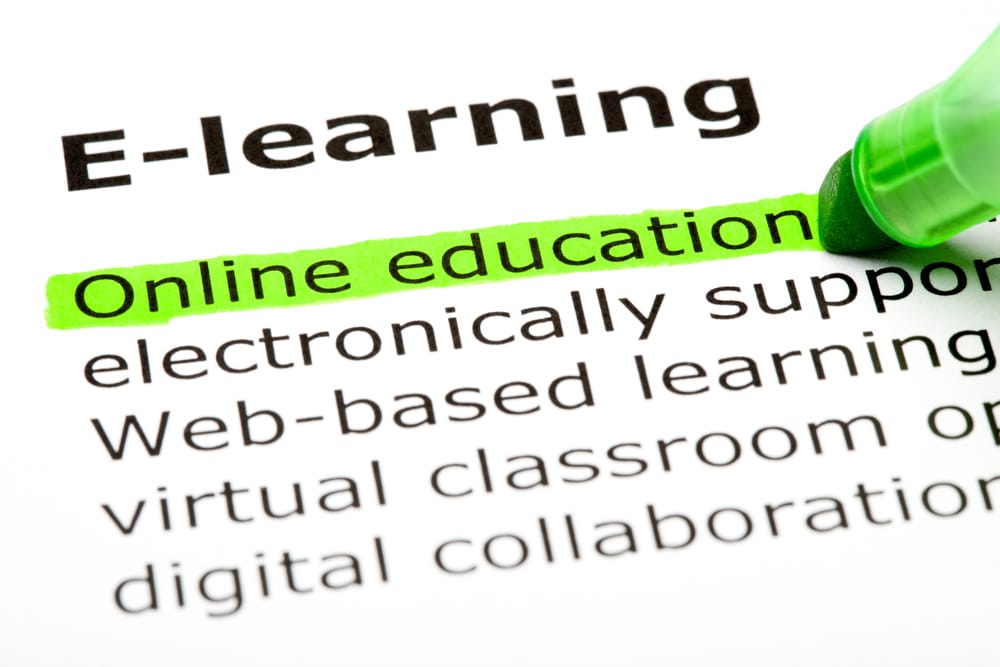 When the COVID-19 pandemic began, many teachers, students, and parents rushed to navigate online learning. Some schools may reopen with social distancing guidelines in place, while others may incorporate a virtual component. To limit COVID-19 exposure while maintaining the quality of education for students, educators will need to embrace online instruction.
When the COVID-19 pandemic began, many teachers, students, and parents rushed to navigate online learning. Some schools may reopen with social distancing guidelines in place, while others may incorporate a virtual component. To limit COVID-19 exposure while maintaining the quality of education for students, educators will need to embrace online instruction.
Navigating new technology can be a big hurdle for veteran teachers. As many school districts are announcing plans to incorporate virtual learning for the upcoming school year, there will be little time for teachers to prepare. Seasoned educators will need a lot of training to master remote instruction and help their students succeed.
Teacher candidates enrolled in online programs can help bridge the gap. These candidates have developed technology skills and experienced asynchronous learning, which puts them in a great position to pivot to remote teaching. With 50 years of experience in distance education and online learning, Walden University faculty are prepared to provide teacher candidates with the knowledge and experience needed for online instruction in PreK-12 schools. Walden even helps teacher candidates develop and practice their skills for the classroom through virtual reality training simulations.
17 Jul2020
By Monika Jo
Since AACTE and Mursion launched the Education Roundtable series, we have had the pleasure of showcasing the work of educators, who have integrated teacher training via virtual reality (VR) simulation into their respective programs or are studying the various aspects of this modality.
In an upcoming three-part mini-series, Carrie Straub, executive director of education programs and research at Mursion, will host a team from Harvard Graduate School of Education (HGSE) who have generously offered to share the magic behind their work. They will upack and discuss the following:
- Recruiting and training simulation specialists
- The development of simulations including how participants are oriented into Mursion experiences, models for simulation designs, and post simulation activities aimed at transferring skills
- The development of four simulations developed through the Reach Every Reader grant which HGSE designed to develop teachers as critical thinkers and learners in the classroom alongside their students
17 Jul2020
By Laila J. Richman and Laurie Mullen
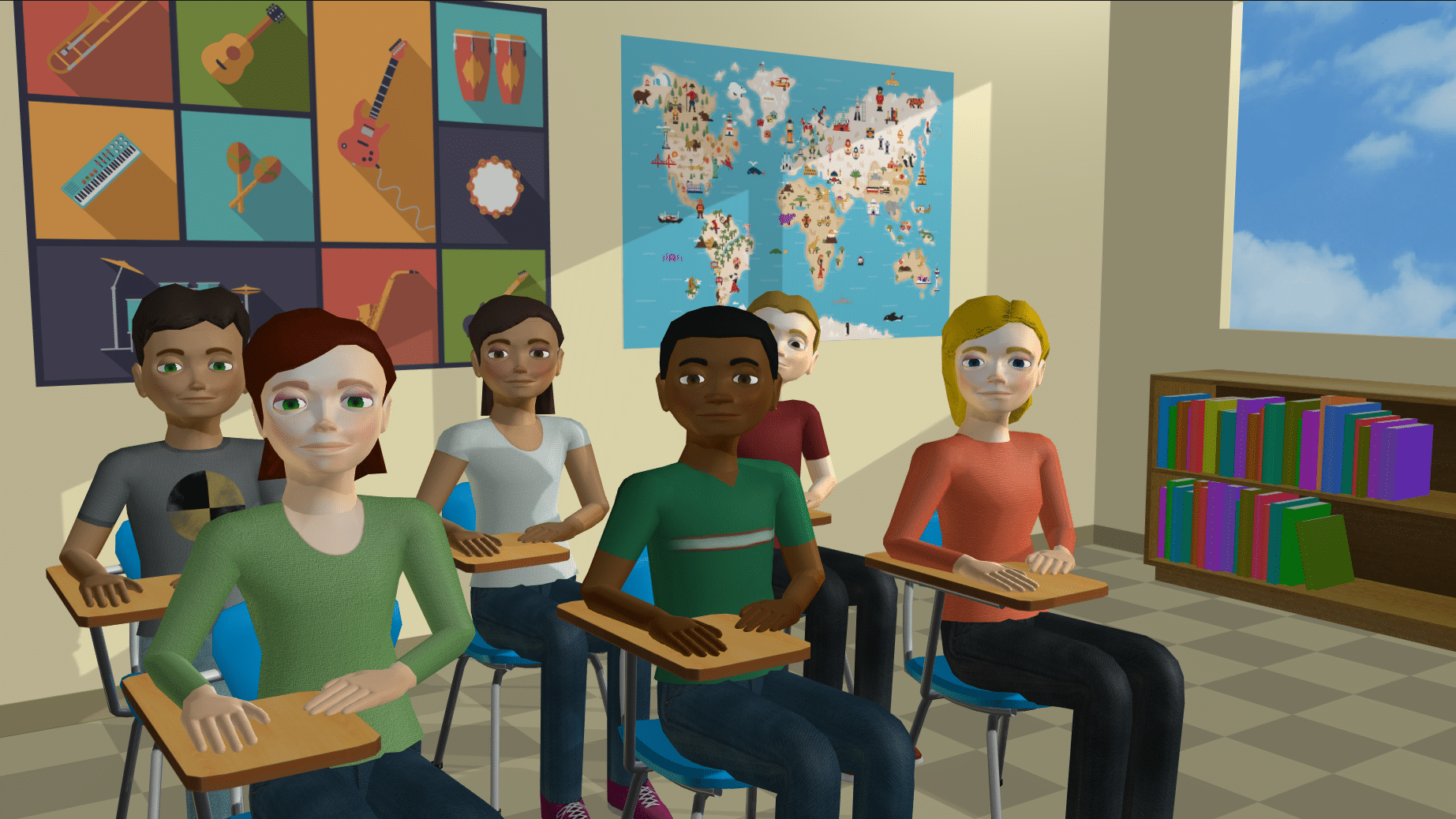
In March, when news of the coronavirus began to spread, one of our first tasks was to decide what to do with the hundreds of candidates who were in schools completing clinical experiences. This was new territory for everyone and no procedures for this type of situation had ever been developed. The decision was made to continue full-time internships, but all other field-based work was halted to allow P-12 teachers to focus on their own instruction and students. Through the strong partnerships we have with our school districts, we were able to navigate the situation and successfully graduate over 400 interns Spring 2020.
As we plan for the fall semester, while we now have some experience and advanced knowledge of the situation, the P-12 landscape will be even more varied—both within and across school districts. It has quickly become apparent that we will need to supplement our field-based work in other ways. We are assembling a range of options, including organizing a video repository, creating data-rich case studies from previous assignments, and building a tutoring network to offer virtual tutoring services to children in our local communities while simultaneously allowing candidates the opportunity to plan, implement, and evaluate their instruction. Another important option we will be utilizing to provide practice opportunities to candidates is SIMTeach@TU, our Mursion simulation system.
13 Jul2020
By Heather Howell
Experiencing disruptions to your elementary mathematics or science methods courses due to COVID-19? We may be able to help!
ETS is currently recruiting teacher educators who will be teaching elementary mathematics or science methods courses in the fall 2020 semester to participate in a new NSF-funded study (#2032179). The study will provide simulated teaching practice through the Mursion® virtual environment to pre-service elementary teachers (PSETs) enrolled in your methods course.
The simulated teaching tasks used in the study focus on leading argumentation-focused discussions in either mathematics or science at the fifth-grade level. Teacher educators selected to participate will incorporate one simulated teaching task into their course as an assignment for their PSETs and will agree to participate in surveys and focus group interviews reflecting on their experience.
For a more detailed description, please follow this link, where you will also be able to apply. Applications close July 27.
Heather Howell is a research scientist at ETS.








 Now that technology is playing a larger role than ever before in teaching and learning, the COVID-19 Education Coalition has curated a list of resources on keeping technology systems safe, protecting student data, and promoting healthy digital decision-making in the newly released
Now that technology is playing a larger role than ever before in teaching and learning, the COVID-19 Education Coalition has curated a list of resources on keeping technology systems safe, protecting student data, and promoting healthy digital decision-making in the newly released 
 If you could build a teacher prep program from scratch, what would it look like?
If you could build a teacher prep program from scratch, what would it look like? 

 Higher education and PK-12 school systems around the country continue to persevere through the pandemic while the policies that structure the new school year continue to change day-to-day. Since the onset of COVID-19, our partners have observed how the pandemic has affected teacher and leadership preparation programs and are excited to share lessons learned. This August, join us for a “Back to School” webinar series with three of our strategic partners: EdPrepLab an initiative of the Learning Policy Institute (LPI) and Bank Street Graduate School of Education, International Society for Technology in Education (ISTE), and the National Board for Professional Teaching Standards, Accomplished Teaching, Learning and Schools (ATLAS) group. In each, we will discuss how to apply what was learned this past spring to the upcoming academic year within higher educator preparation programs.
Higher education and PK-12 school systems around the country continue to persevere through the pandemic while the policies that structure the new school year continue to change day-to-day. Since the onset of COVID-19, our partners have observed how the pandemic has affected teacher and leadership preparation programs and are excited to share lessons learned. This August, join us for a “Back to School” webinar series with three of our strategic partners: EdPrepLab an initiative of the Learning Policy Institute (LPI) and Bank Street Graduate School of Education, International Society for Technology in Education (ISTE), and the National Board for Professional Teaching Standards, Accomplished Teaching, Learning and Schools (ATLAS) group. In each, we will discuss how to apply what was learned this past spring to the upcoming academic year within higher educator preparation programs. When the COVID-19 pandemic began, many teachers, students, and parents rushed to navigate online learning. Some schools may reopen with social distancing guidelines in place, while others may incorporate a virtual component. To limit COVID-19 exposure while maintaining the quality of education for students, educators will need to embrace online instruction.
When the COVID-19 pandemic began, many teachers, students, and parents rushed to navigate online learning. Some schools may reopen with social distancing guidelines in place, while others may incorporate a virtual component. To limit COVID-19 exposure while maintaining the quality of education for students, educators will need to embrace online instruction.